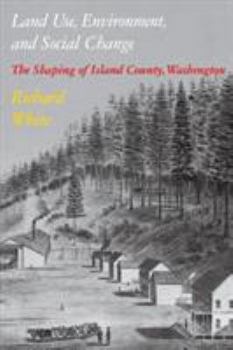Land Use, Environment, and Social Change: The Shaping of Island County, Washington
Select Format
Select Condition 
Book Overview
Whidbey and Camano, two of the largest of the numerous beautiful islands dotting Puget Sound, together form the major part of Island Country. Taking this county as a case study and following its history from Indian times to the present, Richard White explores the complex relationship between human induced environmental change and social change. This new edition of his classic study includes a new preface by the author and a foreword by William Cronon...
Format:Paperback
Language:English
ISBN:0295971436
ISBN13:9780295971438
Release Date:June 1999
Publisher:University of Washington Press
Length:264 Pages
Weight:0.97 lbs.
Dimensions:0.8" x 6.0" x 8.9"
Grade Range:Postsecondary and higher
Customer Reviews
2 ratings
it matters how we use the land
Published by Thriftbooks.com User , 15 years ago
A couple decades ago a new style of research-and-resulting-book appeared. It told the story of land use from the point of view of a historian, including the mutual effect of geography and social organization. This book is one of them (another is Changes in the Land, Revised Edition: Indians, Colonists, and the Ecology of New England by William Cronon). Unfortunately nobody picked up the trend and it died out after an excellent start. Revisiting these old gems is highly worthwhile. They shed light on the intersection of ecology and human populations. By following the same place for decades or even centuries, they show which kinds of human uses fit well into the given geography and which didn't. Who knew that by studying Island County in detail you could find out that: (1) Sustainable Indian population levels were actually *higher* than sustainable non-Indian population levels until quite recently. (2) A political and social "back to the land" movement lasted several decades (even though there was very little evidence behind it), and caused a huge amount of human sorrow. (3) Applying "standard" human use patterns to every different geography resulted in not just very disappointing returns but also permanent ecological damage. (4) Seemingly very minor actions for just a few years (for example overgrazing) resulted in ecological changes that last so long they are essentially permanent. (5) City-folks attitudes dramatically affected on country-folks ways of life. (6) Agricultural over-population made life extremely difficult for the recent arrivals.
Classic of Environmental History
Published by Thriftbooks.com User , 24 years ago
Over the past two decades, Richard White has been one of the truly outstanding historians of the American West, Native America, and the environment. This, his first book, is not nearly as sweeping in scope as his later works, but is a masterful look at the environmental history of a small county in Western Washington that will interest any student of American history. White examines the interaction of humans and the environment in Island County, Washington, to demonstrate how humans have continuously shaped the land over thousands of years, and how these changes have been both conscious and accidental. The opening chapters concern Indian land use in the county, and conclude that native people largely determined the region's landscape by encouraging certain crops through burning of prairies and forests. While this insight is fairly obvious to most environmental historians now, it is a direct contradiction of the European opinion that Indians did not alter the land. White settlers also altered the landscape of Island County by introducing market agriculture and logging. These activities had drastic consequences, some intentional, such as the introduction of European crops, and some unintentional, like massive soil erosion and the accidental spread of the Canadian thistle, a weed that temporarily threatened farmers in the nineteenth century. The final chapters of the book concern twentieth century attempts to encourage settlement of Appalachian farmers on logged-off land (a fascinating New Deal effort that was a complete failure), and the attempt to change the island landscape for the benefit of tourists. This is a fascinating transformation that continues to this day. Overall, this is a very well-written classic of environmental history. The in-depth descriptions of ecological principles may scare off a novice reader, but the history embedded in the ecology is fascinating, and well worth the effort.





